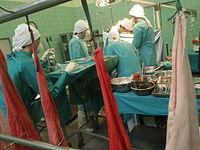
Photo from wikipedia
Glioblastoma (GBM) has shown remarkable resistance to peripherally administered CAR T cell therapy. This is in part because the nuanced requirements for successful CAR-T cell trafficking into brain tumors are… Click to show full abstract
Glioblastoma (GBM) has shown remarkable resistance to peripherally administered CAR T cell therapy. This is in part because the nuanced requirements for successful CAR-T cell trafficking into brain tumors are not well understood. Intracranial administration has been shown to be both safe and effective in delivery of other anti- cancer drugs in GBM, with one example being Gliadel, involving the placement of carmustine chemotherapy-loaded wafers into the post-resection space for sustained release into local brain tissue. Recurrence of GBM is most often local, suggesting that regional therapies might both serve the immediate and long-term needs of the patients. Here we used extracellular matrix-based scaffolds to encapsulate and locally deliver CAR T cells to GBM for enhancement of CAR T cell infiltration and promotion of effector function against GBM. We decellularized and solubilized commercially procured fresh frozen porcine brain tissues to create temperature-responsive porcine brain matrix solutions that gelled at physiologic body temperatures. We confirmed extent of decellularization using DNA quantification of processed tissue and quantified major protein composition of solubilized product using mass spectrometry. Gelation kinetics and resulting hydrogel structures were quantified using turbidometry and rheology, with an average gelation time of 15± 8 min and comparable storage modulus range of 100-200 Pa to Matrigel or Collagen 1-based commercial hydrogel products. Both unmodified healthy donor T cells and donor T cells transduced with EGFRvIII-targeting CAR scFv were >75% viable over 4d in vitro, and release of doses ranging from 2M-5M CAR T cells after encapsulation were observed over 4d in vitro using Transwell inserts. Released CAR T cells were found to be potently cytotoxic in tumor-killing assays using EGFRvIII+ U87MG target cells at 1:1 E:T within impedance cytotoxicity assays, performing comparably to freshly made non-encapsulated CAR T cells and better than CAR T cells released from Matrigel or Collagen scaffolds at the same timepoints. We have developed a mouse model of GBM resection and recurrence to evaluate the efficacy of hydrogel-delivered CAR T cell treatment after resection surgery to capitalize on a currently underutilized treatment window. This injectable scaffold will support an immediate clinical need by supporting delivery, expansion, and actuation of CAR T function within the solid tumor microenvironment without the challenges of peripheral delivery to a specialized organ system. Citation Format: Meghan Logun, Zev Binder, Donald O'Rourke. Porcine brain-derived hydrogel carriers for intratumoral administration of cellular immunotherapies enhances anti-tumor potential in post-resection GBM [abstract]. In: Proceedings of the American Association for Cancer Research Annual Meeting 2023; Part 2 (Clinical Trials and Late-Breaking Research); 2023 Apr 14-19; Orlando, FL. Philadelphia (PA): AACR; Cancer Res 2023;83(8_Suppl):Abstract nr LB026.
Journal Title: Cancer Research
Year Published: 2023
Link to full text (if available)
Share on Social Media: Sign Up to like & get
recommendations!